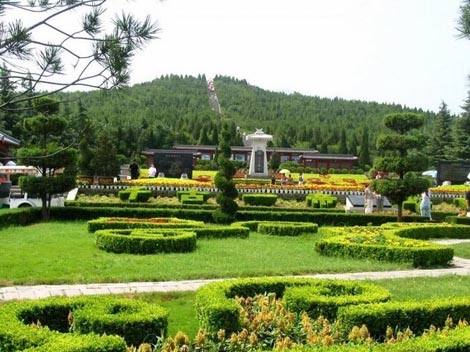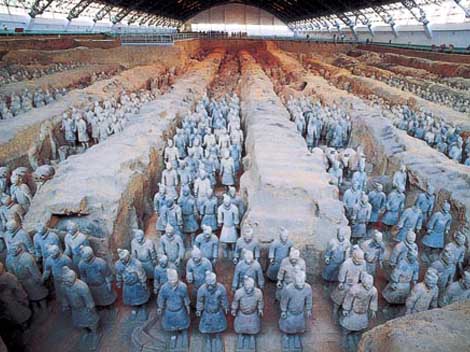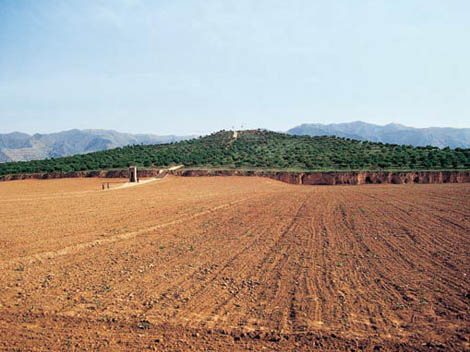more>>More News
- National Day
- ways to integrate into Chinese style life
- Should they be in the same university with me?!!
- Chinese Ping Pang Legend: the Sun Will Never Set
- A Glance of those Funny University Associations
- mahjong----The game of a brand new sexy
- Magpie Festival
- Park Shares Zongzi for Dragon Boat Festival
- Yue Fei —— Great Hero
- Mei Lanfang——Master of Peking Opera
Mausoleum of the First Qin Emperor
By admin on 2015-01-16
Situated at the northern foot of the Lishan Mountain
30 kilometers east of Xi'an in Shaanxi province, the Mausoleum is the tomb of
the first emperor of China’s Qin Dynasty, Qin Shi Huang. Covering an area of
56.25 square km, the mausoleum was originally topped with a mound of 115 m and
at present the height of the covering mound is 76 meters. There are two city
walls inside the cemetery - the inner city wall with a circumference of 3840
meters and the outer city wall 6210 meters. The height of the walls of both
inner and outer cities ranges from 8 to 10 meters. Today there are still relic
sites of walls. In the south is the burial place and in the north are structures
of resting hall and convenience halls. As the first imperial mausoleum in the history of
China, the Mausoleum ranks first of all imperial mausoleums in terms of its
massive scale and rich variety of burial objects. According to historical
records, the mausoleum project had been initiated the next year after Emperor
Qin Shi Huang ascending his throne. Completed in 208 BC, the construction lasted
39 years. It was designed by the Prime Minister Li Si and under the supervision
of the Grand General Zhang Han. A total of 720,000 laborers had been enlisted
for its construction. At its peak period of construction, as many as 800,000 men
had been recruited. The number of men involved was almost eight times as large
as that mobilized for the construction of the Pyramid of Khufu. As is recorded
in the Book of History, the dig of the burial chamber continued until
underground spring was reached. Copper was used to reinforce the base for the
coffin to be laid upon...Inside the burial chamber were placed rare treasures.
The main passageways to the chamber were equipped with machinery that could
trigger the shot of sharp-pointed arrows from powerful crossbows. Tomb robbers
would be shot dead as soon as they approached. The chamber was also filled with
mercury to symbolize the rivers, lakes and oceans. The vault of the burial
chamber was embedded with legendary luminary pearls to represent the sun, the
moon and stars. Fish oil was used to light the chamber in pursuit of everlasting
illumination. The Qin Dynasty is a splendid page in the history of
China. And the Mausoleum of the First Qin Emperor almost embodies the highest
achievement of Qin civilization. Emperor Qin Shi Huang sought to bring
underground and preserve all the luxuries and riches he had enjoyed in his life.
The Terracotta Army unearthed in the Mausoleum has been acclaimed as the "Eighth
Wonder of the World".


- Contact Us
-
Tel:
0086-571-88165708
0086-571-88165512E-mail:
admission@cuecc.com
- About Us
- Who We Are What we do Why CUECC How to Apply
- Address
- Study in China TESOL in China
Hangzhou Jiaoyu Science and Technology Co.LTD.
Copyright 2003-2024, All rights reserved




 Chinese
Chinese
 English
English
 Korean
Korean
 Japanese
Japanese
 French
French
 Russian
Russian
 Vietnamese
Vietnamese
